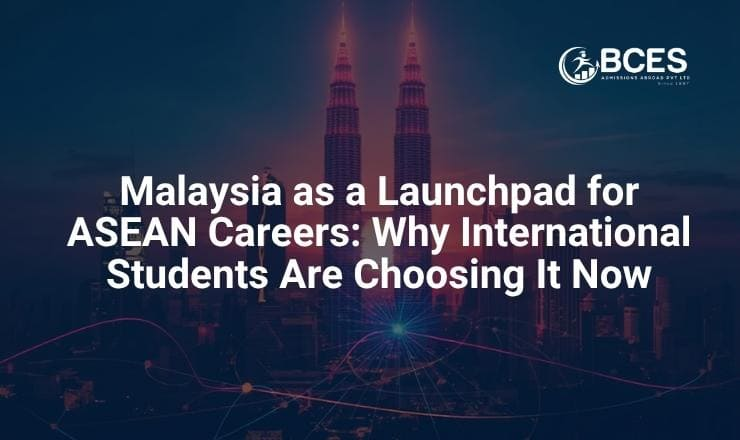Malaysia as a Launchpad for ASEAN Careers: Why International Students Are Choosing It Now

20 November 2025
Have you ever wondered how studying in one country could provide job opportunities and networks right across an entire region? Many international students have exactly these thoughts in mind when they seek study programs in Malaysia. Universities in Malaysia are re-defining education to deliver real opportunity experiences across Southeast Asian regions. Instead of solely granting degrees, Malaysia is developing pathways for students to support their learning in a classroom and link it to emerging markets, industry trends, and professional careers associated with the ASEAN region.
Malaysia has become a sought-after option for students looking for a balance between international study and exposure to Asian growth markets. Universities in Malaysia develop flexible, industry-relevant programs structured around innovation, technology, entrepreneurship, sustainability, and transnational trade. The country’s education setting is rapidly transforming with updates to academic artificial standards, verified institutional and programmatic international accreditation, improved research infrastructure, and stronger ties to the business community. With increasing mobility of students from India, Africa, and the Middle East, more and more Malaysia is viewed as a place where international education can be adapted to local/regional needs.
A key strength is how strategically Malaysia creates pathways with a focus on ASEAN. Institutions collaborate with government, transnational corporations, and regional partners in respect to cross-border project engagement and experiential learning opportunities. Institutions encourage students to engage in collaboration networks and develop their careers in collaboration countries such as Singapore, Thailand, Indonesia, Vietnam, and the Philippines. With the growth of Southeast Asia’s digital sectors, logistics hubs, and trade ecosystems, demand for talent in the region will be unprecedented in the not-too-distant future.
Additionally, student engagement in learning with students from a multitude of national, cultural and linguistic backgrounds helps them to become inherently more confident and flexible learners and professionals. Learning in a multicultural environment fosters a global perspective, cultural intelligence, and plurilingualism, which will subsequently make them more marketable in the global labour force and contribute to the global organization’s pipeline of leaders.
Additionally, Malaysia’s universities are also expanding the rates of support for innovation, entrepreneurship, and technology. Students with new concepts get mentoring regularly, research experience, and access to business incubators and other resources on startup incubation designed to further develop their ideas into market-compliant businesses. These initiatives support students studying international business, digital transformation, or sustainable development as ASEAN economies are investing considerably in green industries, smart cities, and digital economies.
Another strong point is Malaysia’s emphasis on industrial internships in Malaysia, for which students can gain professional experience during their studies. These internship opportunities often relate to regional markets, allowing students to apply theoretical knowledge in real business environments. For sectors like supply chain management, tourism, fintech, and engineering, Malaysia acts as a strategic bridge between Asian markets and international companies.
As universities expand their role in regional development, updated rankings and global recognitions continue reinforcing Malaysia’s credibility on the world stage. The spotlight is being shed on research-driven institutions with new collaborations between campuses in Europe, Australia, and East Asia that are presenting students with opportunities to obtain degrees bearing international value, while maintaining ties to the fast-growing economy of Asia.
Malaysia stands out for students who want global mobility without losing the connectedness to regional opportunities. It provides academic depth, cultural diversity, and Southeast Asia opportunities that go beyond traditional career paths. One can study in Malaysia and build a future that stretches across multiple borders, industries, and cultures.
If higher studies are planned beyond conventional choices and a future is looked forward to, linked with real market growth, Malaysia has something meaningful to offer. We will guide students in course selection, documentation, and admission for a study journey with complete support.
Get in touch with BCES Admissions Abroad at +91 9319996330 to start your admission process in Malaysia and connect with careers across ASEAN.
Frequently Asked Questions (FAQs)
Malaysian universities collaborate with businesses and governments in the region, providing opportunities for cross-border exposure, learning that is relevant to industry, and careers in Southeast Asia.
All programs in the fields of international business, engineering, hospitality management, IT & cybersecurity, and sustainability are strongly aligned to the economic development of the region.
Yes, many universities work with multinationals and organisations in the region to provide students with practical experiences before graduation.
Malaysia provides an internationally recognized education and connection to new economic hubs, as well as international networks in Asia.
Yes, students receive international exposure, professional experience, and access to regional markets that have a strong trading connection to India.